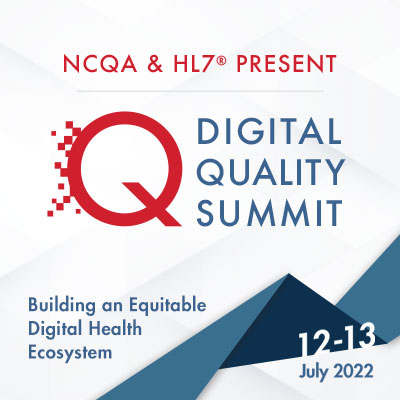Digital Quality Summit: Four Tracks 4 Progress
June 14, 2022 · Matt Brock
 The details are coming together. And we think you’re going to like what we are preparing for this year’s online-only Digital Quality Summit hosted by NCQA and HL7. The summit is just a few weeks from now, July 12-13. There’s still time for you to register for digital health care’s most collaborative conference. Here’s what you can expect:
The details are coming together. And we think you’re going to like what we are preparing for this year’s online-only Digital Quality Summit hosted by NCQA and HL7. The summit is just a few weeks from now, July 12-13. There’s still time for you to register for digital health care’s most collaborative conference. Here’s what you can expect:
Registrants choose from four tracks of content to follow during the two-day event. Stick with one track all the way through, or jump between tracks—whichever you prefer.
Track 1: Health Informatics and Intersectionality
Race, social environment, sexual orientation, religion and gender identity interact to create health inequity. How can technology overcome these problems?
Breakout sessions will explore how new IT and digital standards can fight inequities to help patients of all backgrounds. On the first day, participants will assess the inequities that plague the health care system. Day two will explore digital solutions and policy initiatives to close equity gaps.
Track 2: An Innovative Digital Quality Ecosystem
What does digital quality innovation mean for health care? Many people talk about “reaching digital health’s true potential.” Everyone is talking about the Next Generation of digital quality measures, but what do these measures look like? What are person-centered digital quality measures and how are they better aligned with clinical guidelines than the current measure portfolio?
Track 2 participants will learn how to build a measurement-based value framework that is digitally enhanced and positively disruptive, using colorectal cancer screening as an example. Traditional quality measure specifications have been digitally expressed using FHIR and CQL. But nextgen concepts require a more nuanced reasoning model to enable standard representation of complex clinical decision pathways to align quality measure specs with clinical decision support. This session will present a framework for how BPM+, FHIR and CQL can realize the promise of digital quality.
The track’s third session is all about Data Quality Frameworks. Reproducibility, reliability and validity are key considerations in modernizing the digital quality ecosystem, but most quality measurement validation procedures are manual. These analytic processes must use standard data quality measures, ideally as digital artifacts aligned with the clinical quality measures that reference the data elements being assessed. Finally, the group will look at how to harmonize the needs of both the quality and research communities.
Track 3: Digitally Enabled Care Innovation for Clinicians and Patients
What does digitally enabled care mean for patients and the clinicians who treat them? Track three has that question covered. Attendees will learn how members of the care team experience the move to digital and how digital transformation improves outcomes.
Digital tools and innovations are exciting, but how can we incorporate them into our own areas of influence and make an informed decision about which tools or innovations to pursue? What barriers exist for underserved communities?
The first session will focus on how digital tools and innovations are helping providers deliver high-quality care, particularly to those in underserved communities and those challenged by the digital divide. Then we’ll look at progress during the pandemic. So much has changed in health care and clinical practice the past 2 years. Providers needed to pivot and find solutions to keep treating their patients. We’ll discuss new workflows, innovations and technologies and highlight what has staying power and what won’t be around long-term.
We’ll also take on staffing challenges brought on by Coronavirus. We will focus on digital tools that can help alleviate these challenges and encourage existing staff to continue to provide quality care.
And finally, we’ll conduct a deep dive on how interoperability rules will change digital quality
Track 4: Real World Evidence, Digital Quality Measurement and the Virtuous Circle of the Learning Health System
Find out how real-world evidence, digital quality measures and the learning health system reflect and reinforce each other. Attendees will learn how standardized, computable artifacts are the lifeblood of a learning health system—an improvement cycle where data creates knowledge and insight, resulting in better measures, better care and better health.
You will find more details and an impressive list of presenters and facilitators—more than 60 of them!–on the Summit‘s website.








